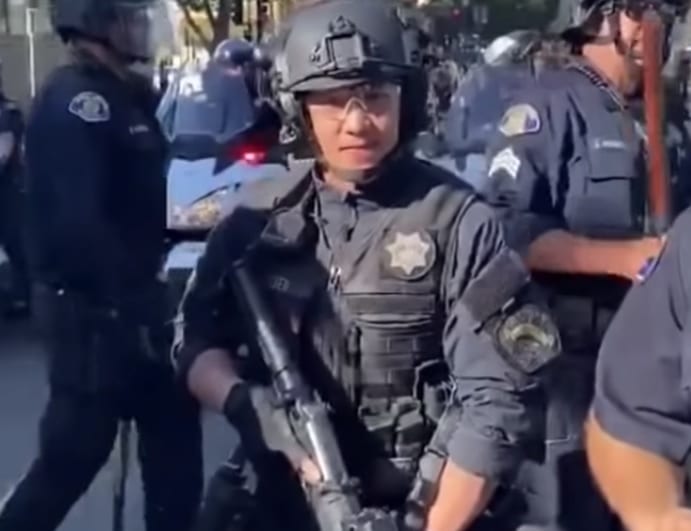“Why are you on that side?” yelled a protester at San Jose Police Officer Jared Yuen.
“Shut up, b—-!” Yuen shouted back.
Months have passed since Yuen’s comments during this year’s protests against the police killing of George Floyd went viral. A petition demanding the city fire Yuen has circulated since June and gathered nearly 140,000 signatures. However, most of the policies keeping Yuen and other officers accused of misconduct on the city’s payroll remain in place.
“It’s not as easy as people would hope it would be for the city to simply fire a police officer,” said Councilmember Raul Peralez, who also is a reserve officer in the San Jose Police Department. “There’s a process we have to follow.”
According to Elsa Cordova, assistant to the city manager, the city doesn’t release “any information related to any pending personnel matters.” She did not say whether the city would fire Yuen.
Tom Saggau, spokesman for the San Jose Police Officers Association, said officers accused of misconduct enjoy the same rights afforded to other public employees.
“The city currently has the ability to fire police officers as quickly as they want to,” Saggau said. “They must conduct an investigation and conduct a Skelly hearing and once that hearing is completed they can fire an officer.” A Skelly hearing gives employees a legal right to view and respond to materials upon which a disciplinary action is based.
In addition, police officers have the right to appeal the termination through either the Civil Service Commission or an independent arbitrator, Saggau said.
The right to arbitration is among many police protections included in the police union’s contract with the city. The latest contract, which outlines compensation and rules of conduct for the department’s 1,100 employees, was approved by the council June 30. This year’s agreement allows the city and police union to renegotiate significant portions of the contract.
However, such negotiations are largely done behind closed doors. Peralez said union agreements are decided in private negotiations between union representatives and city staff. Councilmembers aren’t involved until they study the agreement in closed session. The agreement only becomes public once the council is prepared to vote on it.
Mayor Sam Liccardo said unions are essential to protecting the rights of workers, though over time policies have evolved that make it hard for public agencies to fire bad cops.
“There’s no question that what has been created over the decades in this country is a system that generally regards misconduct as ‘internal affairs,’” Liccardo said.
Pete Constant, a retired San Jose police officer and former city councilmember, said only a relatively small number of police officers are “problems.” Constant attended many closed-session meetings in which lawsuits against officers and disciplinary cases were discussed.
“Oftentimes, a case would come in, and we’d recognize the name,” Constant said. “We’ve heard that name three, four or more times in related situations.”
Constant said union agreements and state laws regarding the confidentiality of investigations and discipline records required the city to keep such officers employed.
“We know that if we had gotten rid of those people the first, second or even the third time, we would have reduced the liabilities for the city and improved the quality of policing for the residents,” Constant said.
In the section of California law known as the “Peace Officers’ Bill of Rights,” police departments can’t take punitive action against officers without offering them an opportunity to appeal the decision. And if an officer appeals using the arbitration process, the city may be forced to reverse the punishment.
In June, Liccardo said changes must be made to the disciplinary process that allows some officers — including San Jose Police Officer Phil White in 2016 — to get their jobs back. He proposed reforming the process that allows “unaccountable arbitrators” to reverse termination decisions of the chief.
Liccardo said the police union contract should remove the binding arbitration process for officers who are fired. Under this process, independent arbitrators can reverse a police department’s decision. White, who was fired in 2016 after tweeting threatening messages to Black Lives Matter protesters, was reinstated using this arbitration process.
“These arbitrators are not accountable to anybody, they don’t have their findings in any way reviewed publicly,” Liccardo said. “We need to change the system of arbitration so that the chief can fire bad cops without having them reinstated.”
The council voted Aug. 4 to put a measure on the November ballot to expand the powers of the city’s Independent Police Auditor. The measure, which includes a card room tax increase and expansion of the city’s Planning Commission, would allow the IPA to review unredacted police records for incidents in which an officer allegedly injured or killed a civilian.
The measure falls short of giving the auditor power to fire officers more efficiently, according to Liccardo. In addition, the police records that the auditor would be allowed to view in its investigations would still remain inaccessible to the public, even through a public records request.
However, the mayor said taking investigations from outside police purview is an important first step. He and his colleagues on the council’s Rules Committee voted to direct the IPA to research how to shift investigatory power away from the police department’s Internal Affairs unit. He said the auditor will recommend specific policy changes for City Council to consider.
Contact Sonya Herrera at [email protected] or follow @SMHsoftware on Twitter.



Leave a Reply
You must be logged in to post a comment.